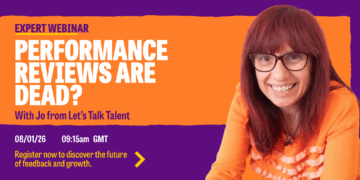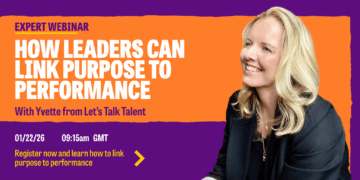Free HR Webinars & Courses For Future HR Leaders By Let's Talk Talent
Upcoming Courses
Performance Reviews Are Dead?
Webinar
|
January 8, 2026 9:15 am
Stop Managing Performance. Start Developing People.
Join HR leaders and forward-thinking managers who are ready to challenge convention and build performance systems that actually work.
How Leaders Can Link Purpose to Performance
Webinar
|
January 22, 2026 9:15 am
When teams lose sight of why their work matters, performance becomes mechanical. But when purpose is alive - visible in behaviours, decisions, and development - performance becomes self-sustaining.
Previous Courses
Webinar - December 4, 2025 9:15 am -
Reset, Refocus, Reimagine Your L&D Strategy for 2026
Webinar - November 20, 2025 9:15 am -
Future Skills for Future Teams
Webinar - November 6, 2025 9:15 am -
The Leadership Blind Spots That Undermine Team Performance
Webinar - October 30, 2025 9:15 am -
The Wrap-Up: 10 Years of Talent – What’s Next for You?
Webinar - October 9, 2025 9:15 am -
Lead Forward – Redefining management in the age of change
Webinar - September 4, 2025 9:15 am -
Strategic HR in 2025: Aligning People with Performance
Webinar - August 28, 2025 9:15 am -
HR Horizon 2026: AI, Agility, and the Art of Human-Centered Leadership
Webinar - July 31, 2025 9:15 am -
Assessment for Impact: Moving Beyond the Tick-Box
Webinar - July 10, 2025 9:15 am -
Coaching That Counts: The Strategic Value of Leadership Coaching
Webinar - June 26, 2025 9:15 am -
Architecting Teams That Exceed Expectations – Webinar
Webinar - June 12, 2025 9:15 am -
HR Business Partnering In Practice – Webinar
Webinar - May 29, 2025 9:15 am -
The Four Pillars Of OD, and What They Mean For You
Webinar - May 16, 2025 9:15 am -
Learning At Work Week – Crafting Mentoring Programmes To Supercharge Team Potential
Webinar - May 15, 2025 9:15 am -
Learning At Work Week – Your Mid-Year Trends Pulse-Check
Webinar - May 13, 2025 9:15 am -
Learning At Work Week – Building Career Pathways That Actually Work
Webinar - May 12, 2025 9:15 am -
Learning At Work Week – Boost Yourself With Networking Career Sprints
Webinar - April 24, 2025 9:15 am -
People First, Results Focused: Aligning Performance With Purpose
Webinar - April 3, 2025 9:15 am -
Supercharge Your Organisation’s Learning At Work Week: From Plan To Impact
Webinar - March 27, 2025 9:15 am -
Beyond the Training Room: Reinventing L&D for Today’s Workplace – Panel Webinar
Webinar - March 13, 2025 9:15 am -
Stretch Every Penny: Maximising Your L&D Budget, Without Compromising On Quality or Impact – Webinar

